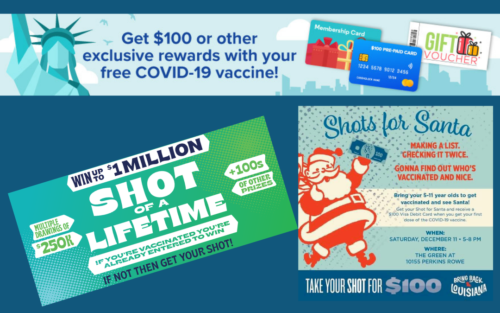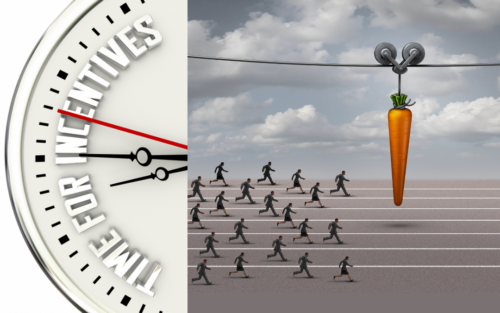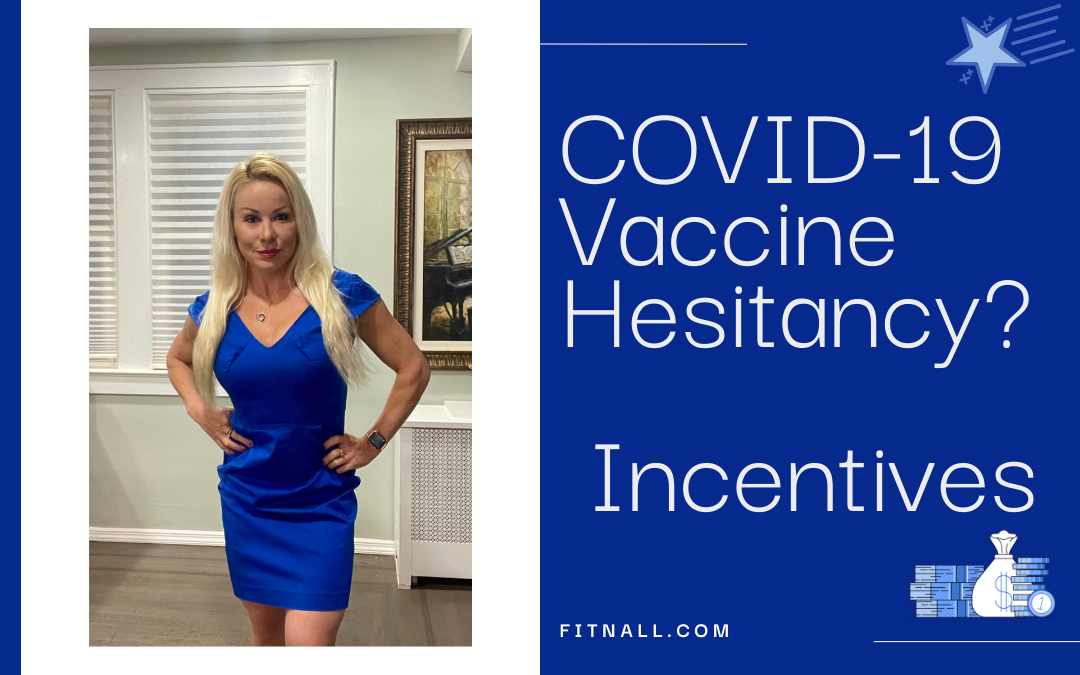In my article, Our Social Atmosphere and The Inception of COVID “Vaccines,” I delved into the social environment of fear created around SARS-CoV-2 as well as death rates, and treatment. Now that vaccine mandates have been introduced around the world, it’s important to look at some of the reasons that can cause COVID-19 “vaccine” hesitancy. Previous posts dealt with vaccine safety, medical effectiveness, medical ethics, big pharma, mandates, emergency use authorization, and Fauci. Now let’s explore the role of “vaccine” incentives.
Soon after declaring Covid-19 a pandemic and a national emergency, Dr. Fauci advocated for lockdowns. Yet based on the mortality rates from other countries, health officials knew early on that people at risk of dying from SARS-CoV-2 were those over the age of 70 and those with underlying conditions. However, governmental responses didn’t address at-risk groups but gave one-size-fits-all recommendations, keeping people indoors, isolated, inactive, jobless, and without access to places of worship.
These draconian recommendations not only created over 43,000 excess deaths that yeat but ruined people physically, emotionally, psychologically, and economically. According to a professor at Harvard Medical School, Martin Kulldorff, “Lockdowns have protected the laptop class of young low-risk journalists, scientists, teachers, politicians, and lawyers while throwing children, the working class, and high-risk older people under the bus.”
There wasn’t even one campaign promoting health practices or habits to help people improve their health or boost their immune systems. On the contrary, we saw a well-organized push for vaccination early on. The push started at the top with the president and Dr. Fauci. The agenda trickled down to mainstream news, massive advertising campaigns, and all the way down to physicians all over the country and even schools – despite the fact that pretty much children have a zero statistical risk of dying from this virus.
Recommendations went beyond medical information into a full-blown effort to coerce and force the public to get injected with gene therapy products that trick the body into making SARS-CoV-2 proteins. President Biden’s single focus was vaccination instead of instilling the importance of improving our health. He refused to support the efforts of frontline doctors who were providing successful treatments for COVID with repurposed drugs and dismissed their knowledge, experience, and research.
At the end of 2021, the President addressed Americans with dictatorial tones, “Many of us are frustrated with the nearly 80 million Americans who are still not vaccinated, even though the vaccine is safe, effective, and free… We’ve been patient, but our patience is wearing thin.”
Fauci has spoken in the past about incorporating more drastic measures such as vaccination passports, vaccine mandates, mandatory vaccination for school children, and even forced COVID-19 vaccinations to get more Americans jabbed.
Incentives

Besides using vaccine mandates, the government started to incentivize people to get vaccinated and urged private companies to do the same. “Vaccine” incentives count on people’s tendency toward instant gratification – humans’ desire to get something right away while avoiding thinking about the later consequences of their actions. This is a classical way to bribe people into doing something they do not want to do.
The following are some of the “vaccine” incentives that have been given across the country to get the COVID-19 “vaccine” ⤵️
Lottery Prizes
Many states have provided lottery prizes: California (10 winners= $1.5 million each, 30 winners= $50,000, 2,000,000 winners= $50 cards), Colorado (Five winners= $1 million), Kentucky (3 winners= $1 million), Maryland (1 winner= $400,000, 40 winners= $40,000), New Mexico (1 winner= $5 million, 20 winners= $250,000), North Carolina (4 winners= $1 million), Ohio (5 winners= $1 million), Oregon (1 winner= $1 million, 36 winners= $10,000), Washington (1 winner= $1 million prize, 4 winners= $250,000), West Virginia (1 winner= $1.588 million, 1 winner= $588,000, 7 winners= $1 million).
Scholarship Programs
Some states (Colorado, Kentucky, Ohio, Oregon) have offered scholarships ranging from $50,000 up to a four-year scholarship to residents under 18 years old.
Free Rides
Lyft and Uber have offered rides and rewards for those using their services to get to vaccination centers.
Dating Rewards
If you belong to a dating site, you may have noticed some rewards too. Some dating apps (BLK, Bumble, Chispa, Hinge, Match, Tinder) have offered higher visibility (boosts and “super likes”) to members who mention their vaccination status.
Food
Upon showing vaccination cards, Some establishments gave away food such as pizza, donuts (Krispy Kreme), coupons for a free item in the menu (Shake Shack, McDonald’s), and cookies (Girl Scouts of America).
Employee Perks
Some companies (Amtrak, Aldi, Chobani, JPMorgan Chase, United Airlines) have given paid time off to those who vaccinate. Other companies (Albertsons, Amazon, American Airlines, Anthem, AutoZone, Bolthouse Farms, BRIA Health Services, Bridgestone, Instacart, JBS, Pilgrim’s, Kroger, Lidl, MetLife, Petco, Publix, Shipt, Tractor Supply Co, Walmart) have given cash rewards ranging from $25 to $500 for those who get their shots.
Discounts, Gift Certificates, Prizes
Many states have offered incentives as well. Some of the goodies have been State-Park day passes, gift certificates, hunting rifles and shotguns, chances to drive around speed tracks, and chances to win hunting and fishing licenses. In Washington state, state-licensed cannabis retailers are giving one marijuana joint to adult consumers who receive a vaccination at an in-store vaccination clinic.
Are Incentives Legal?
“Vaccine” incentives come into question when taking a legal perspective and codes related to experimentation. As you know the COVID-19 “vaccines” given in the US are experimental. They haven’t been approved by the FDA, haven’t gone through animal trials, and haven’t completed human trials.
According to Informed Consent Law (45 CFR 46), it is illegal to force, mandate, coerce, or incentivize participation in an ongoing clinical trial. It is, also, unethical to force children under 18 years of age to participate in an experiment. Therefore incentivizing people to take the experimental SARS-CoV-2 shot is unlawful.
Are Incentives Ethical?

“Vaccine” incentives can be challenged when taking into consideration OHRP’s recommendations [the Office for Human Research Protections (OHRP) provides leadership and guidance in the protection of the rights, welfare, and wellbeing of human subjects involved in research].
According to the OHRP, incentives that go beyond reimbursement of the participant’s expenses or minimal rewards present an undue influence. Undue influences occur when there is “an offer of an excessive or inappropriate reward or other overture in order to obtain compliance.” These influences interfere “with the potential subjects’ ability to give voluntary informed consent” – [Undue influences are also addressed in the FDA regulations 21 CFR Part 50.20 and the corresponding HHS regulations 45 CFR Part 46.116]
Issues to Consider:
- Medical decisions are supposed to take place without interference from emotional responses caused by excitement or fear or from financial incentives. Vaccine decisions should be made on medical factors, no other factors that confound decision-making.
- Incentives can be so appealing that they become a form of coercion. They influence people’s real voluntary choices.
- Triggering someone’s strong emotions (excitement or fear) has the tendency to make people neglect probabilities of risk, which leads people to irrationally interpret probabilities in their favor. This is the “probability neglect” effect. Having exciting incentives can trump people’s ability to analyze the consequences of taking the shot (this gene therapeutic that we have not much information on since clinical trials are still ongoing).
- Incentives have unequal effects on different segments of society. They can be exploitative when dealing with vulnerable people. Generally, those who take the bait (accept the incentives) are those who struggle financially, those who are marginalized, and those who do it to put food on the table or to have the chance to experience some type of out-of-reach reward.
- Incentivizing people with money or other perks creates Over-reliance on the government. This shouldn’t be encouraged since it doesn’t reinforce autonomy or create responsible citizens.
- Most importantly, When children are involved, there should be no inducement system. If parents are vaccinating their children for free meals or the possibility to win lotteries or other prizes, that they may not be able to afford otherwise, is unfair.
After taking into consideration the points above, giving incentives to take the experimental SARS-CoV-2 shot is unethical.
Are You Hesitant to Get COVID-19 “Vaccines”?
If you are hesitant to get the COVID “vaccine,” you may be right to be. Hearing about “vaccine” incentives such as free money, lotteries, and goodies should set off loud alarm bells in your head and egg you to think critically about what’s really going on.
The fact that there are so many incentives being offered for vaccination should make you, at least, pause before getting the shot. Medical Products and treatments or any other kind of programs or products that are highly beneficial for people don’t need to be continually incentivized.
Incentives definitely influence participation. They are exploitative of vulnerable people and leverage economic hardship to increase vaccination. Offering incentives introduces motivations that corrupt pure medical decision-making. Incentives to participate in the experimental COVID shot are unethical and unlawful.
In a free society, intrusions into people’s lives, their bodies, and their choices shouldn’t exist. Most people know what’s good for them. given information from different sources, people are capable of making decisions and flock toward products and programs willingly without the need for any form of coercive tactic, mandates, or incentives.
To a Fitter Healthier You,
The Fitness Wellness Mentor



